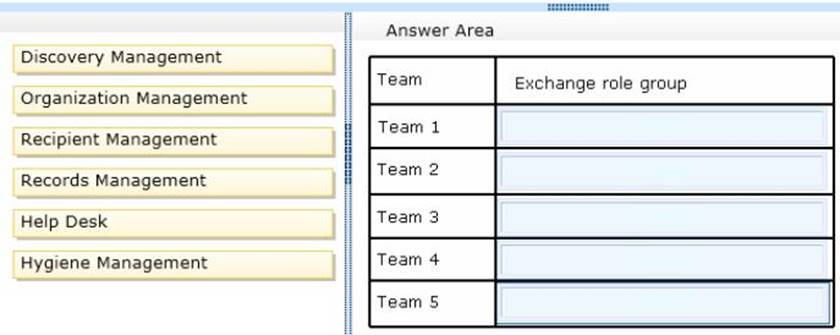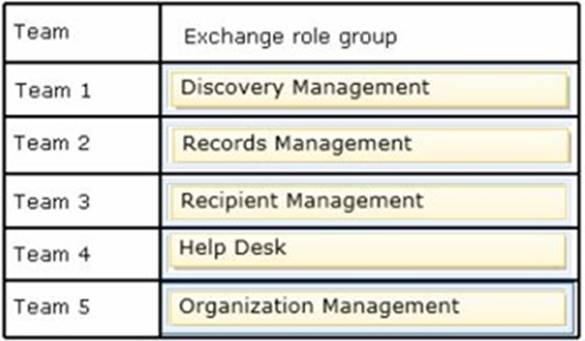- All Exams Instant Download
To which role group should you assign each team?
DRAG DROP
DRAG DROP
You are deploying Office 365 for your organization.
You are preparing to delegate permissions by using the built-in Microsoft Exchange Online role groups. You must assign teams to the roles that give them the least permissions while still allowing them to perform the following tasks:
You need to delegate permissions to the teams.
To which role group should you assign each team? To answer, drag the appropriate role group to the correct team. Each role group may be used once, more than once, or not at all. You may need to drag the split bar between panes or scroll to view content.

Answer: 
Explanation:
Discovery Management: Administrators or users who are members of the Discovery Management role group can perform searches of mailboxes in the Exchange organization for data that meets specific criteria and can also configure litigation holds on mailboxes.
Records Management: Users who are members of the Records Management role group can configure compliance features, such as retention policy tags, message classifications, transport rules, and more.
Recipient Management: Administrators who are members of the Recipient Management role group have administrative access to create or modify Exchange 2013 recipients within the Exchange 2013 organization.
Help Desk: Users who are members of the Help Desk role group can perform limited recipient management of Exchange 2013 recipients. The Help Desk role group, by default, enables members to view and modify the Outlook Web App options of any user in the organization. These options might include modifying the user’s display name, address, phone number, and so on. They don’t include options that aren’t available in Outlook Web App options, such as modifying the size of a mailbox or configuring the mailbox database on which a mailbox is located.
Organization Management: Administrators who are members of the Organization Management role group have administrative access to the entire Exchange 2013 organization and can perform almost any task against any Exchange 2013 object, with some exceptions. Of the groups listed, the Organization Management group is the only that can create and manage security groups.
References:
https://technet.microsoft.com/en-us/library/dd638105(v=exchg.150).aspx
Latest 70-347 Dumps Valid Version with 314 Q&As
Latest And Valid Q&A | Instant Download | Once Fail, Full Refund
Subscribe
Login
0 Comments
Inline Feedbacks
View all comments

